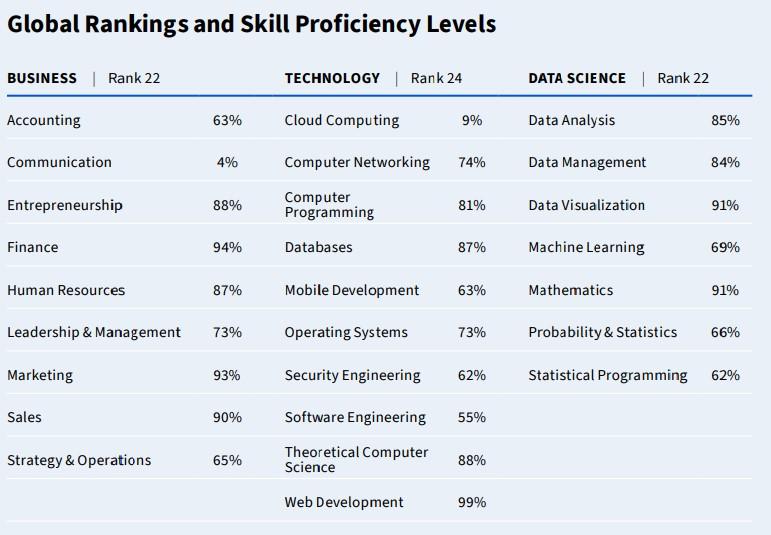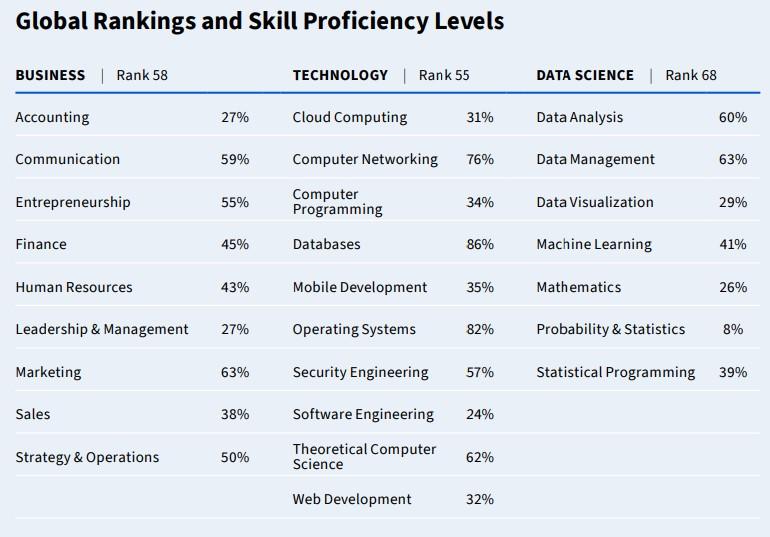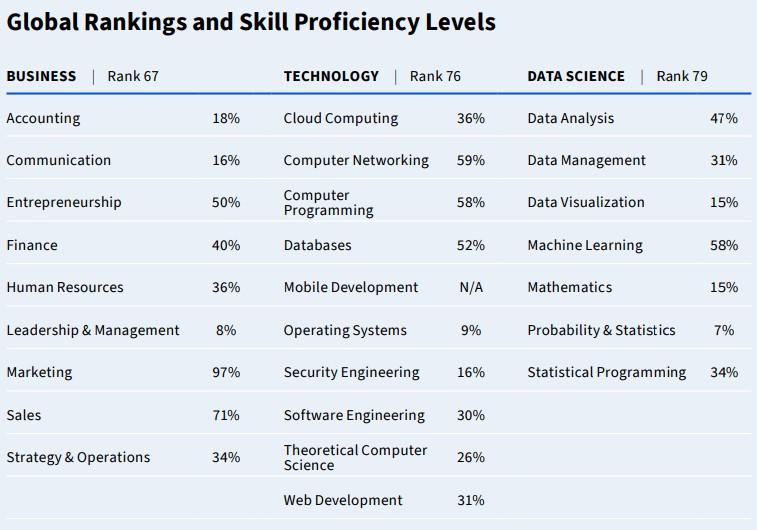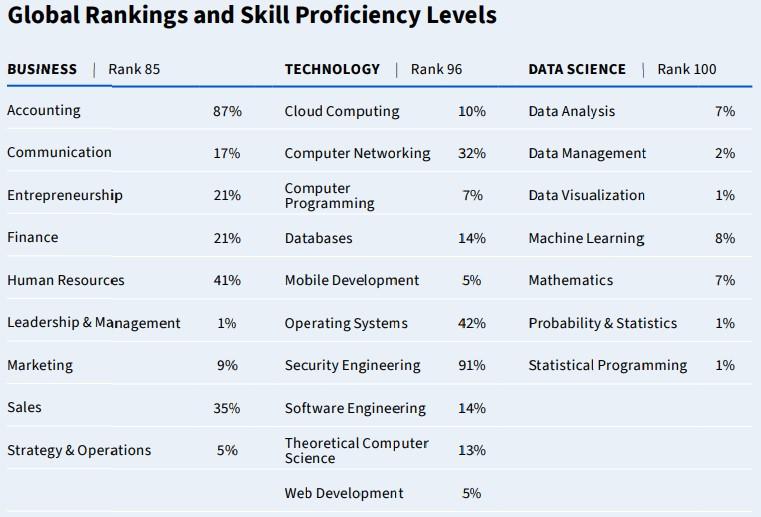share on
In terms of strengths and opportunities, seven APAC markets have obtained an overall 'cutting-edge' skill proficiency score—including Indonesia, Singapore, Hong Kong, and South Korea.
With business expected to grow, so are the skills of the workforce. Learners in the region are, on average, more proficient in data science and technology skills than business skills.
According to Coursera’s latest annual Global Skills Report 2023, two countries in APAC have made it to the top 10 for overall skills proficiency—Japan and Indonesia—and the second highest regional average year-on-year growth rate in professional certificates.
In terms of strengths and opportunities, seven APAC markets have attained what the report cited as an overall cutting-edge skill proficiency score—including Japan, Indonesia, Singapore, Hong Kong, and South Korea.
However, there is considerable variation across markets in the region when it comes to specific skill domains. For business skills such as finance and entrepreneurship, Hong Kong (85%) and Singapore (79%) lead the region. For technology skills, Indonesia (98%) leads, followed by Kazakhstan (96%) and Japan (92%), while Indonesia (100%), Japan (98%), and Hong Kong (94%) lead the region in data science skills.
On the whole, the top 10 APAC markets for skills proficiency are:
- Japan (5th globally)
- Indonesia (6th globally)
- Singapore (16thglobally)
- Hong Kong (20th globally)
- South Korea (26th globally)
- Kazakhstan (31st globally)
- China (34th globally)
- Cyprus (37th globally)
- Taiwan (40th globally)
- Vietnam (55th globally)
The fifth edition of the report draws data from 124mn learners to benchmark more than 100 markets in three of the most in-demand skill areas driving employment in the digital economy - business, technology, and data science.
Particularly, the study found:
- Economic growth is tied to skill proficiency.
- Internet access is tied to economic opportunity.
- Learners in high-income countries are more likely to invest in learning human skills.
- Learners with postgraduate education are most likely to invest in AI-related skills.
- Many countries are closing the gender gap in online learning.
- Learners around the world are preparing for digital roles with professional certificates.
The data was broken down by market, with selected APAC market findings showcased below:
Singapore findings
Singapore ranks 16th globally and third in APAC. The country scores competitively in all three domains, solidifying its position as a global leader committed to enhancing the workforce.
According to the report, Singapore learners have demonstrated outstanding proficiency in critical future skills amidst the growing labour market demands created by the rapid pace of globalisation, digital transformation, and AI advancements.
Learners were particularly interested in developing business skills such as fintech, blockchain and investment management, and AI-related data science skills such as computer vision and applied machine learning.
This combination of coveted digital skills is creating the foundation for Singaporean learners to make the most of the economic opportunities created by new technological advances.
Learners scored in high percentiles for business (79%), technology (77%), and data science (79%) skills, with ‘cutting-edge’ scores across the board. Globally, Singapore sits in the 91st percentile for overall skills proficiency, showing the country’s commitment to upskill to keep its talent pool competitive in the global job market.
Singaporeans were also more likely to develop AI skills proficiency than those in other countries. Trending AI-skills among learners in Singapore include deep learning, applied machine learning, artificial neural networks, python programming, and data structures.
Research also showed that women learners in Singapore were well-rounded with cutting edge skill proficiency across the three domains:
- Business (92%)
- Technology (80%)
- Data Science (77%)
Lastly, there is a rising demand for industry micro-credentials for digital jobs. The report highlights a 16% year-on-year increase in enrollments for professional certificates among Singapore learners. This supports the trend that individuals are increasingly turning to online micro-credentials to secure new jobs and advance their career.

Malaysia findings
Malaysia ranks 67th globally and 14th in APAC, with the report noting an opportunity to improve skill proficiencies across domains, especially in data science.
In terms of strengths and opportunities, Malaysian learners achieved competitive scores for business skills such as:
- marketing (63%),
- communication (59%), and
- entrepreneurship (55%).
However, data science is the nation’s strongest domain with learners achieving cutting-edge ratings in computer networking (76%), operating systems (82%), and databases (86%), although there is an opportunity to further improve software engineering (24%), in particular. While the country ranks 68th overall in data science, learners achieved competitive scores in data management (63%) and data analysis (60%).
Interestingly, learners in Malaysia were more likely to invest in business skills like fintech (1.24x), advertising (1.18x), and investment management (1.17x), in comparison to learners in other countries. In technology, learners were investing in user experience (1.17x), data structures (1.11x), and computer graphic techniques (1.08x).

Thailand findings
Thailand ranks 83rd globally and 18th in APAC. The report suggests that there is an opportunity for regional leaders in the country to further invest in data science and technology skills and to harness both learner interest in over-indexing skills and professional certificates aligned to these domains to do so.
Particularly, Thai learners demonstrated the strongest proficiency in business skills, achieving a cutting-edge score in marketing (97%), but this domain could benefit from further investment in skills like leadership & management (8%).
In technology skills, Thai learners scored as competitive in:
- databases (52%),
- computer programming (58%), and
- computer networking (59%).
Data science skills constituted the greatest area for investment, with competitive scores in machine learning (58%). Meanwhile, there were lower scores in mathematics (15%), data visualisation (15%), and probability & statistics (7%).

India findings
In India, professional certificates were especially in demand — 96% of students agreed that this will help them secure the job that they desire.
Overall, learner performance levels still varied significantly between states, resulting in lower overall scores for the nation — it ranks 60th globally, and 13th in APAC.
Despite this trend, learners demonstrated high business skill proficiency, earning cutting-edge scores in skills like communication (76%) and human resources (88%). Learners also scored well in technology, with proficiency scores in mobile development (84%), and are competitive in theoretical computer science (68%), web development (54%), software engineering (51%) and cloud computing (73%).
Data science represents the greatest opportunity for improvement.

The Philippines findings
Significantly, the Philippines leads the world in y-oy- professional certificate enrollment growth rate. However, there is an opportunity for regional leaders in the country to further develop business skill proficiency by harnessing learner interest in skills like social media and advertising.
While there are opportunities to further invest in business, technology, and data science skills, learners are achieving high proficiency scores in some areas — they demonstrated a cutting-edge proficiency in the business skill accounting (87%), as well as in the technology skill security engineering (91%).
Data science represents an opportunity for investment across the board.
Ranking wise, the Philippines came out 99th globally, and 22nd in APAC for skills proficiency.

Lead image./ Coursera
share on


